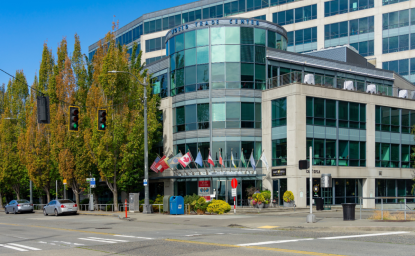I arrived London on Thursday, the day of the BREXIT referendum. London looked the same as usual—people going about their business. I saw none of the “I voted” lapel stickers or the usual campaign signs or bumper stickers, which in this case would have read “remain” or “leave,” that one would see in America on a voting day. Probably a good many Londoners were going about their business as usual, confident that the “remain” side would win handily; London supported it by a significant margin, and must have thought the rest of the country would follow suit. So did Scotland; so did Northern Ireland.
But the rest of the country felt differently. A divided Britain was asked by a divided government to make most momentous decision the country had made since 1940, when it decided to stand alone and fight rather than give in to a then-overweening German threat to invade. (Although that decision was not put to referendum, it could not have been sustained without great popular support, which Winston Churchill rallied and solidified). The original intent for Thursday’s referendum was to resolve the Conservative Party’s division over British membership in the European Union by asking the electorate to choose for it. The danger of doing this in a country that was clearly also divided on that issue – by the repressed feelings of anger on the part of a significant number of citizens from the working and lower middle classes who have been left behind by globalization, and who blame their difficulties on the European Union (EU) – was evidently overlooked.
BREXIT seems some sort of romantic midsummer night’s dream – a magic escape from all the vicissitudes that will mark the century ahead by simply disengaging with the EU. But, like it or not, migration will likely be a stubborn characteristic of the 21st century.
In the June 23 referendum, unlike in 1940, a majority of the British people decided to cut and run. As far as I can tell, fear played a large role in this decision. The fear factor was the main theme of both sides. The “remain” side mainly tried to scare voters by emphasizing the economic damage that BREXIT would cause. The “leave” side played to the fear of the working and lower middle classes in the UK of immigrants (the other) taking their jobs and the feeling of loss of control over their own lives to an external authority (the EU Commission), as well as the fear they were being sold out by the elites of Britain. These are fears that were easily exploited by those (mostly demagogues) who were leading the charge for “leave.”
This fear is neither irrational nor invisible. For decades now the working classes of the Western industrial countries have been losing ground to the forces of globalization while the elites have prospered. Inequality has grown inexorably in these countries, as a result of deindustrialization, wage stagnation, policies that favor the wealthy in some, and in all very little understanding by governments of the problem (or recognition that it is a problem) let alone any serious programs to rectify it.
Tangible surrogates, immigration especially, have become the symbols of these intangible forces for the working classes. These symbols, of course, are erroneous oversimplifications at best, but they are easy symbols for demagogues and unprincipled politicians to exploit. Although there are definite undercurrents of racism in the anti-immigration rhetoric of some of those who supported “leave,” the feeling against immigrants is more complicated than that. It is more a fear of the “other” that is being unleashed; after all, most of the EU immigrants are white also. Although the toxic connotations these symbols have taken on are of great concern, they reflect a real problem—several generations of citizens who believe themselves to be victims of impersonal, uncontrolled and pernicious global forces, and the subjects of exploitation by the country’s elite who benefit from these forces. So they now reject the arguments of the elite as to what direction is in the national interest.
And here lies the irony and perhaps the tragedy. The path they have chosen reminds me of the song title, “Stop the world, I want to get off.” BREXIT seems some sort of romantic midsummer night’s dream – a magic escape from all the vicissitudes that will mark the century ahead by simply disengaging with the EU. But, like it or not, migration will likely be a stubborn characteristic of the 21st century. War and civil conflict in the Middle East and possibly South Asia will continue to push refugees westward. The growing population of the poorer countries, as well as political instability, bad governance, and just plain better opportunity will continue to draw many who seek a better life toward the West. While it is not yet universally accepted, it is possible that environmental crises could add to the migrant flow further out. Withdrawing from the EU is not likely to stop the immigration pressure on the UK, nor any of the Western countries.
The irony is that this referendum may start a chain of events that leads to the UK breaking up. Is that what the “leave” voters wanted? Scotland is fierce on staying in the EU and has threatened already to hold another referendum on independence, which would probably gain approval this time. And, surprisingly, some leaders in Northern Ireland have suggested that maybe the time has come for the six counties of the North to join the Republic of Ireland. After all these years of bloodshed and hatred, could the UK’s decision to abandon the EU do something the British and Irish could never do – create a united Ireland? It seems farfetched that the religious issues could be put aside so fast, but then it seemed very unlikely only six months ago that the British would leave the EU, and that decision may be creating a tidal wave in which smaller countries seek the comfort of larger partners.
In fact, seeking larger partners may be the route most nations take, at least those not yet captivated by the siren song of “taking their country back.” Try as we may, I doubt we can escape the trials and tribulations of globalization by hiding in the weeds somewhere. Inter- national airlines, international banks and banking systems, the internet and other communications systems are tying the world more closely together all the time. Societies in Asia and elsewhere in the so-called third world are showing that they are just as technically good as we are, with cheaper labor.
For decades now the working classes of the Western industrial countries have been losing ground to the forces of globalization while the elites have prospered.
But globalization, because of its rapid growth and its complexity, is not all good. In fact if it were, I would not be writing this and the UK would not have voted to leave the EU, probably not even raised the question. It will have to be guided and formed to fit countries’ social needs, and one serious deficit needs to be addressed quickly—that is the segments of our populations that have been left behind by the impersonal and efficiency driven forces of globalization.
Finally, I mentioned above the meanness and narrowness of the remain-leave debate, the resort to fearmongering on both sides, and to implicit racism and xenophobia on the “leave” side. That tone, unfortunately, meant there was no opportunity to have a serious discussion of the sustainability of the EU as a regional organization. I, for one, am very skeptical that the EU as presently structured and oriented is sustainable, and I fear that continuing to push in the direction it has been may be self-destructive. But I believe equally strongly that a restructured European Union is necessary to the peace and prosperity of Europe. A discussion on making it viable and sustainable needs to start in the EU and its member states, and sadly the UK would have added a voice of reason and erudition to the discussion which may now be absent.
The opinions expressed here are solely those of the author.
This article originally appeared in The Friday Times






